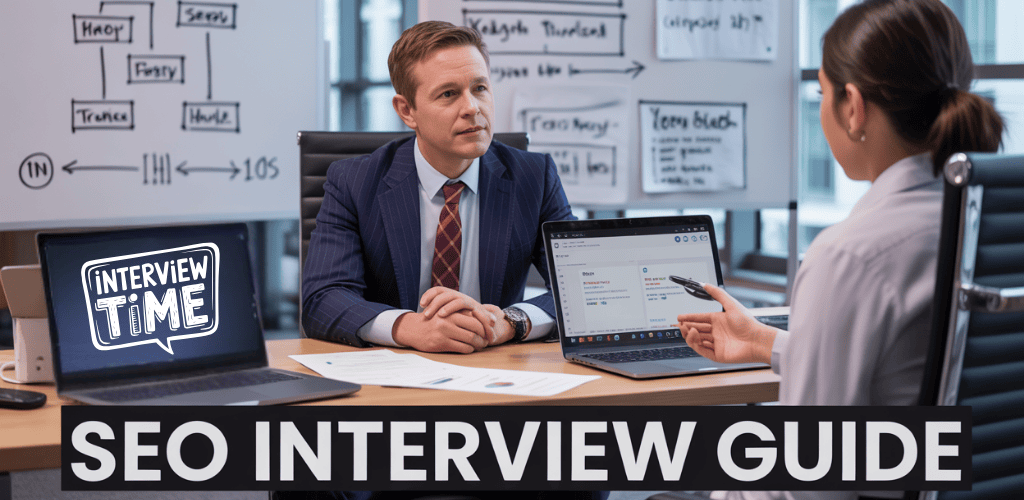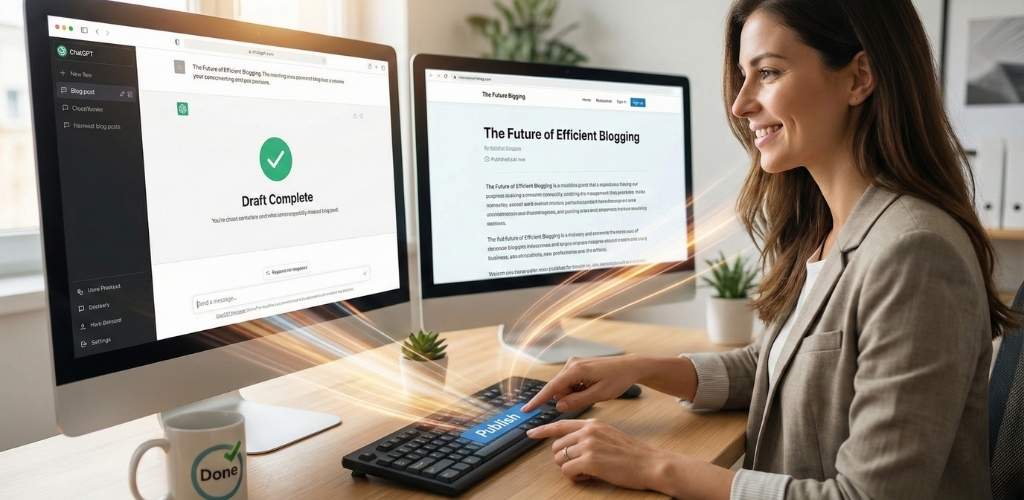Landing an SEO role requires demonstrating both technical expertise and strategic thinking to hiring managers who want to see real results. This comprehensive guide provides interview questions for SEO positions along with proven answers that will help you stand out from other candidates.
Who this guide is for: SEO professionals at all levels – from entry-level specialists to experienced SEO managers – who want to ace their next technical SEO interview and secure their dream position.
You’ll discover essential SEO concepts every candidate must know, including the fundamentals that form the backbone of search optimization. We’ll cover advanced technical SEO interview questions that test your deep understanding of crawling, indexing, and ranking factors. Finally, you’ll learn how to tackle SEO manager interview questions that assess your ability to develop comprehensive strategies and lead successful campaigns.
Whether you’re preparing for your first SEO role or looking to advance to a senior position, these SEO interview answers will give you the confidence to showcase your skills and land the job.
Table of Contents
Essential SEO Concepts Every Candidate Must Know
Understanding Organic vs Paid Search Results
When preparing for SEO interview questions, distinguishing between organic and paid search results is fundamental knowledge that every candidate must demonstrate. Organic results are provided by search engines based on relevance, quality, and other ranking variables, appearing naturally in search engine results pages (SERPs). These results are sometimes known as ‘free results’ or ‘natural outcomes’ because they are unpaid and earned through effective SEO strategies.
The primary advantage of organic search results lies in their cost-effectiveness. SEO techniques enable companies to rank for possible keywords without paying a dollar on search engine marketing, resulting in the most valuable visitors. This organic traffic represents users who are genuinely interested in the content or services being offered, making them highly valuable for businesses.
In contrast, paid results refer to advertisements where advertisers pay to show their ads alongside organic results on SERPs. These paid advertisements offer immediate visibility, and advertisers are not obligated to enhance their website and content to rank initially. Your position in paid results is determined by your maximum cost-per-click (Max CPC) bid and quality score, making it a more direct but costly approach to gaining search visibility.
Understanding this distinction is crucial for technical SEO interviews, as it demonstrates your grasp of fundamental search engine mechanics and the value proposition of SEO services.
Distinguishing Between On-Page and Off-Page SEO
Now that we have covered the basic search result types, let’s explore the two primary categories of SEO optimization. On-page SEO refers to optimization of elements directly on a website, including content, HTML tags, internal linking, and site structure, to make it more search engine-friendly and relevant to target keywords. These are controllable elements that SEO professionals can directly influence.
Key on-page SEO factors include:
- Keywords integration and optimization
- Content quality and relevance
- Page structure and HTML elements
- Internal linking strategies
- Page load time optimization
- Meta tags and descriptions
Off-page SEO focuses on activities outside the website that influence its authority and credibility in search engines. This primarily involves link building strategies to acquire backlinks from other reputable websites. Off-page SEO relates to external factors that signal to search engines that your website is trustworthy and authoritative within its niche.
The most critical off-page factor is acquiring quality and relevant backlinks, which serve as endorsements from other websites. These backlinks are signals of endorsement that help improve your website’s credibility and search rankings. Link building involves developing relationships with other website owners and creating valuable content that naturally attracts links.
Both on-page and off-page SEO work together to create a comprehensive optimization strategy. While on-page SEO ensures your website is technically sound and content-rich, off-page SEO builds the authority and trust signals that search engines use to determine your website’s ranking potential.
Mastering Keyword Density, Difficulty, and Proximity
With this understanding of SEO fundamentals in mind, let’s examine critical keyword metrics that every SEO candidate must understand. These metrics form the foundation of effective keyword strategy and are frequently discussed in SEO manager interviews.
Keyword Density represents the proportion of times a specific keyword appears relative to the total word count on a page. This metric helps ensure optimal keyword usage without falling into the trap of keyword stuffing, which can negatively impact search rankings. The key is achieving balance – using keywords naturally within the content while maintaining readability and user engagement.
Keyword Difficulty measures how challenging it is to rank for a specific term based on the competition level. This metric is essential for developing realistic SEO strategies and setting appropriate expectations for ranking achievements. Understanding keyword difficulty helps SEO professionals prioritize their efforts on terms where they have a reasonable chance of success while building authority for more competitive keywords over time.
Keyword Proximity refers to the distance between related keywords or phrases on a page. Search engines use proximity as a relevance signal, with closer keyword placement often indicating stronger topical relevance. This concept extends to understanding how semantically related keywords work together to provide context and improve content relevance.
Additionally, Keyword Frequency indicates how many times a specific keyword occurs on a page, while understanding long-tail keywords – highly specific phrases of more than four words – becomes crucial for targeting user intent and achieving higher conversion rates.
These keyword metrics work together to inform content creation strategies and help SEO professionals make data-driven decisions about content optimization. Mastering these concepts demonstrates analytical thinking skills that are essential for success in any SEO role.
General Interview Questions That Assess Your Professional Foundation
Personal Background and Career Motivation Questions
When approaching interview questions for seo positions, hiring managers often begin with foundational questions that reveal your professional journey and motivations. These questions help employers understand not just your technical capabilities, but also your passion for the field and alignment with their company culture.
Expect questions like “Why did you choose SEO as your career path?” This question assesses your genuine interest in the field versus simply viewing it as a job opportunity. A strong response demonstrates understanding of SEO’s impact on business growth and your enthusiasm for the constantly evolving nature of search algorithms. Consider sharing specific moments that sparked your interest in SEO, whether it was seeing organic traffic results from your first campaign or witnessing how search visibility transformed a business.
“What attracted you to our company specifically?” is another common inquiry that tests your research and genuine interest. Your answer should reference the company’s SEO challenges, recent campaigns, or industry reputation. This shows you’ve done your homework and aren’t simply mass-applying to positions.
Career transition questions frequently arise, especially if you’re moving from related fields like content marketing or web development. Employers want to understand how your previous experience translates to SEO and what unique perspectives you bring. Highlight transferable skills while acknowledging areas where you’re actively developing SEO-specific expertise.
Strengths, Weaknesses, and Work Environment Preferences
Professional self-assessment questions are crucial components of SEO interview answers that reveal your self-awareness and growth mindset. When discussing strengths, align them with SEO-specific competencies such as analytical thinking, attention to detail, or ability to interpret complex data sets. Provide concrete examples of how these strengths have contributed to successful SEO outcomes.
The weakness question requires careful navigation. Choose genuine areas for improvement that won’t disqualify you but show professional growth. For instance, you might discuss initial challenges with technical SEO implementation while emphasizing the courses you’ve taken or certifications you’ve pursued to address this gap. This demonstrates proactive learning and self-improvement.
Work environment preferences help employers determine cultural fit. SEO roles often require both independent analysis and collaborative strategy development. Express comfort with data-driven decision making, cross-functional teamwork with content creators and developers, and adaptability to algorithm changes. Mention your preference for environments that encourage experimentation and learning from both successes and failures.
Questions about handling pressure and deadlines are particularly relevant in SEO roles where algorithm updates can require rapid response. Demonstrate your ability to prioritize tasks, maintain quality under pressure, and communicate effectively with stakeholders during challenging periods.
Time Management and Attention to Detail Assessment
Technical SEO interview scenarios often include questions that evaluate your organizational skills and precision—critical traits for successful SEO practitioners. Employers may ask about managing multiple client accounts or campaigns simultaneously, requiring you to demonstrate systematic approaches to prioritization and workflow management.
Describe your methods for staying organized, whether through project management tools, content calendars, or systematic reporting schedules. Emphasize how you balance long-term strategic initiatives with immediate tactical needs, such as addressing technical issues while maintaining ongoing optimization efforts.
Detail-oriented questions might involve scenarios about auditing websites, implementing schema markup, or analyzing performance data. Your responses should showcase systematic approaches to complex tasks, such as using checklists for technical audits or establishing quality control processes for content optimization.
Time management in SEO requires understanding both immediate wins and long-term strategy development. Discuss how you allocate time between different types of SEO activities—keyword research, content optimization, technical fixes, and performance analysis. Demonstrate awareness that SEO results often require patience while maintaining focus on metrics that matter most to business objectives.
SEO manager interview questions may probe deeper into resource allocation and team coordination. Show understanding of how individual tasks contribute to broader campaign success and your ability to communicate progress effectively to stakeholders who may not understand SEO intricacies.
SEO Background and Experience Questions

Educational Background and Training History
When evaluating candidates for SEO roles, hiring managers frequently explore educational foundations and continuous learning commitments. While formal education in marketing, computer science, or communications provides valuable groundwork, many successful SEO professionals have diverse academic backgrounds coupled with specialized training.
Common interview questions for SEO professionals include inquiries about relevant coursework in digital marketing, web development, or data analytics. Candidates should be prepared to discuss how their educational background translates to practical SEO applications. For instance, a journalism degree demonstrates content creation skills, while computer science education showcases technical aptitude for technical SEO interview scenarios.
Professional certifications carry significant weight in the SEO industry. Google Analytics Individual Qualification (IQ), Google Ads certifications, and HubSpot Content Marketing credentials demonstrate commitment to staying current with industry standards. Advanced training from platforms like SEMrush Academy, Moz Academy, or Screaming Frog SEO Spider certification courses shows dedication to specialized skill development.
Self-directed learning through industry blogs, podcasts, and conferences indicates passion for the field. Candidates should articulate specific resources they follow, such as Search Engine Land, Moz Blog, or Search Engine Journal, and explain how this knowledge impacts their strategic approach.
Tools and Content Management Systems Experience
SEO manager interview discussions inevitably focus on technical proficiency across essential tools and platforms. Comprehensive tool experience demonstrates both analytical capabilities and practical implementation skills.
Analytics platforms form the foundation of SEO measurement. Google Analytics 4 proficiency is non-negotiable, including understanding of conversion tracking, custom dimensions, and audience segmentation. Google Search Console expertise encompasses performance monitoring, indexing issues identification, and search appearance optimization.
Keyword research tools experience should span multiple platforms. Candidates must demonstrate familiarity with SEMrush, Ahrefs, Moz Keyword Explorer, or similar enterprise-level tools. Understanding of keyword difficulty metrics, search volume analysis, and competitor keyword gap analysis showcases strategic thinking capabilities.
Technical SEO tools knowledge includes Screaming Frog SEO Spider for site audits, GTmetrix or PageSpeed Insights for performance analysis, and Schema markup validators. Advanced candidates might discuss experience with log file analysis tools like Botify or DeepCrawl for large-scale websites.
Content management system experience varies by organization needs. WordPress proficiency remains crucial, including plugin management (Yoast SEO, RankMath), theme optimization, and database management. Enterprise CMS platforms like Drupal, Sitecore, or Adobe Experience Manager require specialized knowledge for larger organizations.
Marketing automation and CRM integration experience demonstrates holistic digital marketing understanding. HubSpot, Marketo, or Salesforce integration capabilities show ability to connect SEO efforts with broader marketing objectives.
Keyword Research and Analytics Proficiency
Keyword research methodology reveals strategic thinking and analytical depth. SEO interview answers should demonstrate systematic approaches to keyword discovery, analysis, and implementation planning.
Effective keyword research begins with comprehensive seed keyword identification through competitor analysis, customer interviews, and internal stakeholder consultations. Advanced practitioners utilize multiple data sources, including Google Keyword Planner, SEMrush, Ahrefs Keywords Explorer, and Answer the Public for comprehensive keyword universe mapping.
Search intent classification skills are essential for modern SEO success. Candidates should articulate understanding of informational, navigational, commercial, and transactional intent categories, explaining how intent alignment influences content strategy and funnel positioning.
Long-tail keyword strategy development demonstrates sophisticated understanding of search behavior patterns. Successful candidates explain how long-tail variations capture specific user needs while often presenting lower competition opportunities for ranking improvements.
Competitive keyword analysis involves identifying competitor content gaps and opportunities. This includes understanding competitor keyword rankings, content quality assessment, and strategic positioning for competitive advantages.
Analytics interpretation skills extend beyond basic traffic reporting. Advanced practitioners discuss cohort analysis, attribution modeling, and statistical significance testing for SEO experiment validation. Understanding of organic search contribution to overall business objectives through revenue attribution and conversion path analysis demonstrates business acumen.
Successful SEO Project Examples and Challenge Management
Project-based interview questions for SEO professionals require concrete examples demonstrating measurable impact and problem-solving capabilities. Strong candidates prepare specific case studies showcasing strategic thinking, implementation excellence, and results achievement.
Technical SEO project examples might include site migration management, Core Web Vitals optimization, or large-scale duplicate content resolution. Candidates should detail project scope, stakeholder coordination, implementation timelines, and measurable outcomes including traffic recovery or ranking improvements.
Content strategy projects demonstrate editorial and optimization expertise. Successful examples include content audit and optimization programs, topic cluster development, or featured snippet capture campaigns. Quantifiable results such as organic traffic increases, engagement improvements, or conversion rate optimization showcase business impact.
International SEO projects reveal complex technical and strategic capabilities. Hreflang implementation, multi-regional content strategies, or local market penetration campaigns demonstrate advanced skill sets valuable for global organizations.
Challenge management scenarios test problem-solving abilities under pressure. Algorithm update recovery, negative SEO attack mitigation, or sudden traffic drops require systematic diagnostic approaches and strategic response planning. Candidates should explain methodical troubleshooting processes, stakeholder communication strategies, and long-term prevention measures.
Cross-functional collaboration examples highlight communication and project management skills. Working with development teams on technical implementations, coordinating with content teams on editorial calendars, or collaborating with paid media teams on integrated campaigns demonstrates versatility and leadership potential essential for senior SEO roles.
Advanced Technical SEO Interview Questions

A. SEO Strategy Formation and Implementation
Effective technical SEO interview questions in this area focus on assessing a candidate’s ability to develop comprehensive SEO strategies and execute them successfully. When evaluating potential hires, it’s crucial to understand their approach to technical SEO auditing and problem-solving capabilities.
A fundamental question revolves around how candidates perform a technical SEO audit. Strong candidates should demonstrate they have their own systematic SEO process rather than relying on fully automated tools that make decisions without human analysis. They should use a combination of different tools and be able to explain their methodology, show examples of previous audits, and discuss the measurable results their recommendations achieved when implemented.
Another critical assessment involves presenting scenario-based challenges, such as a website that’s been online for 9 months but receives zero organic traffic. This question tests critical thinking and creative problem-solving abilities. Experienced professionals understand that solutions can range from simple fixes – like removing a no-index tag or fixing Google Analytics tracking – to complex technical analyses requiring deep investigation beyond basic indexability checks.
B. Meta Tags, Title Tags, and Content Optimization
Technical SEO professionals must demonstrate comprehensive knowledge of on-page optimization elements and their implementation. Understanding meta tags and title tag optimization forms the foundation of technical SEO expertise, as these elements directly impact how search engines interpret and display website content.
When discussing content optimization strategies, candidates should show familiarity with structured data implementation and schema markup. This specialized code helps search engines understand website content better, potentially leading to rich snippets that can significantly increase click-through rates and improve visibility in search results.
Advanced candidates will also understand the relationship between content optimization and Core Web Vitals, recognizing how page experience factors into overall SEO performance and user satisfaction metrics.
C. URL Structure and Canonical Issue Detection
URL optimization represents a critical technical SEO skill set that separates experienced professionals from newcomers. Strong candidates should understand URL indexing verification methods, particularly the site: command and other Google search operators for filtering search results. They should also demonstrate familiarity with Google Search Console’s Coverage report and explain how it differs from basic site: commands.
Canonical tag implementation presents another essential area of expertise. When presented with scenarios involving hundreds of duplicate pages, experienced technical SEO specialists should mention checking the index status of these pages, examining user-declared and Google-selected canonicals (potentially using the URL Inspection Tool API), and analyzing the internal linking structure. Importantly, qualified candidates will understand that duplicate content doesn’t automatically result in penalties – a common misconception among less experienced practitioners.
D. Link Auditing and Video Content SEO
Technical SEO interview questions should assess understanding of link analysis and optimization strategies. Candidates must distinguish between dofollow and nofollow links, understanding that dofollow links pass SEO value while nofollow links don’t transfer ranking authority and are typically used for sponsored or untrusted content.
Advanced professionals should also demonstrate knowledge of JavaScript SEO optimization and its impact on crawlability. They should understand the differences between server-side rendering, pre-rendering, and dynamic rendering, particularly for websites with significant JavaScript-generated content that needs to be accessible to search engines.
E. Top SEO Interview Questions (and how to answer them)
Several key technical SEO interview questions consistently appear across different organizations and roles. Website crawling expertise remains fundamental – candidates should be familiar with multiple crawlers like Screaming Frog, Sitebulb, Deepcrawl, and JetOctopus. More importantly, they should understand advanced crawler configuration, JavaScript execution capabilities, user agent modification, data interpretation, and issue prioritization.
Page speed and Core Web Vitals analysis represents another crucial competency. Qualified candidates should use both Google PageSpeed Insights and Google Search Console’s Core Web Vitals report, understanding the difference between lab data (Google Lighthouse) and field data (CrUX report), and knowing when to prioritize field data for decision-making.
When discussing XML sitemaps, candidates should differentiate between low-impact errors (deprecated parameters) and high-impact issues (indicating non-indexable pages). They should understand when sitemaps become critical – particularly for large sites with potential indexability issues – and how to use them for crawl budget optimization.
F. What tools to mention in an SEO interview
Technical SEO professionals should demonstrate proficiency with Google Search Console as their primary tool. They should articulate specific use cases including the Coverage report and its various buckets, the Page Experience report and its limitations, the Crawl Stats report for analyzing Google’s crawling behavior, and methods for analyzing internal linking structures.
Website crawler expertise should extend beyond basic domain crawling to include advanced configurations for checking specific metrics like Page Speed Insights data in bulk, JavaScript execution for comparing rendered versus source HTML, and user agent modifications for troubleshooting crawl issues.
Additional tools candidates should mention include Google PageSpeed Insights, GTmetrix, WebPageTest for performance analysis, and Schema Markup Validator, Google Rich Results Test for structured data validation. Chrome extensions like Detailed SEO for quick structured data analysis also demonstrate practical, hands-on experience.The most qualified candidates will reference Google Search Central documentation, SEO office hours with John Mueller, and other authoritative SEO resources, indicating they stay current with industry developments and best practices.
URL Optimization and Search Engine Ranking Factors

Domain URL Optimization Techniques
When tackling technical SEO interview questions, candidates must demonstrate comprehensive knowledge of URL optimization strategies. Several key techniques form the foundation of effective domain URL optimization that search engines prioritize when crawling and indexing websites.
Canonicalization stands as one of the most critical URL optimization techniques. This process prevents search engines from flagging sites as duplicate content by establishing a preferred version of each URL. Implementing canonical URLs ensures that search engine crawlers understand which version of a page should be indexed, eliminating potential penalties for duplicate content issues.
Keyword Integration represents another fundamental approach to URL optimization. Including target keywords within the URL structure provides search engines with clear signals about page content relevance. However, this integration must be balanced – keywords should appear naturally without creating overly complex or stuffed URLs that could negatively impact user experience.
URL Simplicity and Structure directly influences both search engine understanding and user navigation. Maintaining simple, relevant URLs that reflect the page content hierarchy creates a logical structure that search engines can easily crawl. Consistent URL patterns throughout a website improve organization and help establish clear site architecture that supports overall SEO performance.
URL Length Considerations also play a crucial role in optimization. Shorter URLs typically perform better in search results and are easier for users to remember and share. Complex, lengthy URLs with unnecessary parameters or subdirectories can dilute the effectiveness of optimization efforts.
Key Factors Search Engines Consider for Rankings
Search engines evaluate multiple ranking factors when determining website positions in search results. Understanding these factors becomes essential for SEO interview success, as they form the basis of comprehensive optimization strategies.
Content Quality emerges as the primary ranking consideration. Search engines prioritize websites that provide valuable, relevant content that satisfies user search intent. This includes proper content optimization through strategic keyword placement, natural language use, and comprehensive coverage of topics.
Domain Authority significantly impacts search rankings. Search engines assess the overall trustworthiness and credibility of a domain based on factors like backlink quality, site age, and historical performance. Building domain authority requires consistent effort in creating authoritative content and earning high-quality backlinks from reputable sources.
Page Speed Performance directly affects user experience and search rankings. Search engines favor websites that load quickly across all devices, as slow-loading pages contribute to higher bounce rates and poor user engagement metrics.
Link Quality encompasses both internal and external linking strategies. High-quality backlinks from authoritative domains pass trust and authority signals to target websites. Internal linking helps establish content hierarchy and distributes page authority throughout the site structure.
User Experience Signals include metrics like bounce rate, time on site, and click-through rates from search results. These behavioral signals indicate content relevance and user satisfaction levels, influencing long-term ranking performance.
HTTPS Security and Mobile Optimization Requirements
Modern search engines prioritize websites that meet contemporary security and accessibility standards. HTTPS encryption and mobile optimization have evolved from optional enhancements to essential ranking requirements.
HTTPS Implementation ensures secure data transmission between users and websites. Search engines now consider HTTPS certificates as a ranking factor, favoring secure sites over non-encrypted alternatives. This security protocol protects user data and builds trust, which translates to better search performance.
Mobile-First Indexing reflects the shift in user behavior toward mobile device usage. Search engines now primarily use the mobile version of websites for indexing and ranking purposes. This means that mobile optimization directly impacts search visibility across all device types.
Responsive Design Requirements ensure that websites function effectively across various screen sizes and devices. Mobile optimization includes fast loading times, touch-friendly navigation, readable text without zooming, and properly sized clickable elements.
Mobile Page Speed requires special attention, as mobile users typically have less patience for slow-loading content. Optimizing images, minimizing code, and leveraging browser caching become critical for maintaining competitive mobile performance.
These technical requirements demonstrate the evolution of SEO from simple keyword optimization to comprehensive user experience enhancement, making them frequent topics in advanced SEO manager interviews.
Content Creation and Keyword Strategy Questions

Maintaining Appropriate Keyword Density in Content
Keyword density remains a fundamental aspect of SEO content creation that frequently surfaces in interview questions for SEO professionals. While search engines have evolved beyond simple keyword matching, understanding the balance between optimization and natural content flow demonstrates your expertise in modern SEO practices.
The concept of keyword density refers to the percentage of times a target keyword appears in relation to the total word count of your content. However, seasoned SEO professionals understand that maintaining appropriate keyword density isn’t about hitting a specific percentage—it’s about creating content that serves user intent while incorporating keywords naturally.
When discussing keyword density in SEO interview answers, candidates should emphasize that over-optimization can lead to keyword stuffing penalties. Modern search algorithms prioritize content that reads naturally and provides value to users. The key is to incorporate primary keywords in strategic locations such as title tags, headers, and naturally throughout the body content without forcing their placement.
Long-tail keywords play a crucial role in maintaining healthy keyword density. As mentioned in professional SEO discussions, long-tail phrases include more than four words and are very specialized. These keywords indicate the purpose and quality of the search, leading to higher conversion rates when adequately targeted. The ideal implementation involves using long-tail keywords naturally within blog content, where they can drive targeted traffic with better commercial intent.
Incorporating Keyword Stemming and Variations
Now that we have covered basic keyword density principles, let’s explore how keyword variations enhance content optimization strategies. Keyword stemming involves using different forms of your target keywords—including synonyms, related terms, and grammatical variations—to create comprehensive content that captures broader search intent.
This approach aligns with how modern search engines understand semantic relationships between words. Instead of focusing solely on exact-match keywords, successful SEO professionals incorporate related terms that support the main topic while maintaining content readability.
When answering technical SEO interview questions about keyword variations, demonstrate your understanding of how search engines process language. For instance, if your primary keyword is “SEO strategy,” incorporating variations like “search engine optimization tactics,” “SEO planning,” and “optimization strategies” creates semantic richness that search engines recognize and reward.
The strategic use of keyword variations also helps avoid repetitive content that might appear unnatural to readers. This technique allows you to maintain keyword relevance while creating engaging, informative content that serves user needs effectively.
Balancing SEO Requirements with Content Quality
Previously, we’ve discussed technical aspects of keyword implementation, but the most challenging aspect of content creation involves balancing optimization requirements with genuine value delivery. This balance frequently appears in SEO manager interview scenarios where candidates must demonstrate strategic thinking beyond technical execution.
Quality content creation requires understanding that SEO serves the broader goal of connecting users with valuable information. While keywords help search engines understand your content’s relevance, the primary focus should always remain on user satisfaction and engagement metrics.
Bounce rate serves as a critical indicator of this balance. According to SEO best practices, bounce rate refers to the proportion of website visitors who depart the landing page without viewing any other pages or taking action. High bounce rates often indicate that content fails to meet user expectations, regardless of how well-optimized it might be for keywords.
To reduce bounce rates and maintain quality while meeting SEO requirements, focus on boosting page engagement through internal links, clear calls-to-action, and improved page performance. This approach demonstrates understanding that successful SEO content must satisfy both search engine algorithms and human readers.
With this in mind, next, we’ll see how rich snippets factor into content quality considerations. Rich snippets are featured text that appears at the top of organic search results, sometimes with images. While rich snippets are not direct SEO ranking factors, they can deliver better results on SERPs when properly implemented through structured data markup.
The key to balancing SEO requirements with content quality lies in creating comprehensive, valuable content that naturally incorporates optimization elements rather than forcing SEO elements into otherwise valuable content.
SEO Manager & Strategy Questions

Strategic Leadership Questions for SEO Manager Roles
When interviewing for SEO manager positions, you’ll encounter questions that assess your strategic thinking and leadership capabilities. These SEO interview answers require demonstrating your ability to develop comprehensive SEO strategies while managing cross-functional teams and stakeholder relationships.
Developing and Implementing SEO Strategies
As an SEO manager, your approach to strategy development forms the foundation of your role. When asked about developing SEO strategies, emphasize your systematic methodology. Start by explaining how you conduct comprehensive site audits to identify current strengths and weaknesses. Detail your process for analyzing competitors and market opportunities, then outline how you align SEO objectives with broader business goals.
Your strategy should encompass both on-page and off-page elements, technical optimizations, and content initiatives. Mention how you prioritize tasks based on impact potential and available resources. A strong answer demonstrates your ability to think holistically about SEO while considering technical constraints, budget limitations, and timeline requirements.
Campaign Management and Success Measurement
Successful SEO managers excel at measuring and communicating campaign effectiveness. When discussing how you measure SEO success, focus on key performance indicators that matter most to business outcomes. These typically include organic traffic growth, conversion rates, keyword ranking improvements, and revenue attribution from organic channels.
Explain your approach to tracking these metrics using tools like Google Analytics, SEMrush, or Ahrefs. Detail how you create comprehensive reporting dashboards that provide stakeholders with clear visibility into campaign performance. Emphasize your ability to analyze data trends and make data-driven decisions to optimize future strategies.
Cross-Functional Collaboration and Team Leadership
Technical SEO interview questions often explore your collaborative skills. SEO managers must work effectively with content creators, web developers, design teams, and marketing professionals. Describe your communication strategies for conveying complex SEO concepts to non-technical stakeholders.
Provide specific examples of how you’ve guided content teams on SEO best practices, collaborated with developers on technical implementations, and aligned with marketing teams on integrated campaigns. Highlight your ability to provide clear SEO guidelines and ensure consistent implementation across all teams.
Crisis Management and Problem-Solving
Algorithm updates and ranking drops test an SEO manager’s crisis management abilities. When discussing how you handle sudden ranking declines, outline your systematic diagnostic process. This includes analyzing recent website changes, reviewing Google Search Console for manual penalties, examining algorithm update timelines, and assessing competitor movements.
Demonstrate your methodical approach to recovery planning. Explain how you prioritize fixes based on impact potential and implementation difficulty. Show your ability to remain calm under pressure while developing comprehensive recovery strategies that address root causes rather than symptoms.
Strategic Planning and Project Prioritization
Managing multiple SEO projects simultaneously requires exceptional organizational skills. When asked about task prioritization, explain your framework for evaluating projects based on business impact, urgency, resource requirements, and strategic alignment.
Detail how you use project management tools to track progress across multiple initiatives. Describe your process for communicating priorities to stakeholders and adjusting plans when circumstances change. Emphasize your ability to balance short-term wins with long-term strategic objectives.
Advanced SEO Considerations
Modern SEO managers must understand emerging trends like voice search optimization, mobile-first indexing, and E-A-T (Expertise, Authoritativeness, Trustworthiness) factors. Discuss your experience adapting strategies for these evolving search behaviors.
For voice search, explain how you optimize for natural language queries and conversational search patterns. When addressing E-A-T, detail your strategies for building domain authority, showcasing expertise through content, and establishing trustworthiness through transparent practices and credible backlink profiles.
These SEO manager interview questions assess your strategic thinking, leadership capabilities, and ability to drive measurable business results through comprehensive search engine optimization initiatives.
E-commerce & Local SEO Interview Questions

Core E-commerce SEO Questions
When interviewing for e-commerce SEO positions, expect questions that focus on online retail-specific challenges and opportunities. These questions assess your understanding of product optimization, conversion-focused SEO, and the unique technical requirements of e-commerce platforms.
What are the key differences between e-commerce SEO and traditional SEO?
E-commerce SEO differs significantly from traditional SEO in several ways. First, the primary focus is on product pages and category structures rather than content marketing. E-commerce sites typically have thousands or millions of product pages that need optimization, requiring scalable SEO strategies. The conversion funnel is more direct, with users often having high commercial intent when searching for products. Additionally, e-commerce SEO must address technical challenges like duplicate content from product variations, dynamic URLs, and complex site architecture with multiple filtering options.
How do you optimize product pages for search engines?
Product page optimization involves multiple elements working together. Start with keyword-rich product titles that include the primary keyword naturally. Write unique, detailed product descriptions that go beyond manufacturer specifications – include benefits, use cases, and target relevant long-tail keywords. Optimize product images with descriptive alt text and file names. Implement structured data markup, particularly Product schema, to enhance search results with rich snippets showing price, availability, and ratings. Ensure fast page load times and mobile responsiveness, as these directly impact both SEO and conversion rates.
What is your approach to handling duplicate content in e-commerce?
Duplicate content is a major challenge in e-commerce due to product variations, similar products, and manufacturer descriptions. Use canonical tags to consolidate similar product pages and specify the preferred version for search engines. Implement proper URL parameters handling through Google Search Console. Create unique product descriptions rather than using manufacturer content. For product variations, consider using a single page with variant selectors rather than separate pages for each color or size. Address duplicate content from faceted navigation by using robots.txt, noindex tags, or canonical tags appropriately.
Local SEO Fundamentals
Now that we’ve covered e-commerce specifics, let’s examine local SEO interview questions that focus on location-based optimization strategies.
What are the three main pillars of local SEO?
The three foundational pillars of local SEO are proximity, relevance, and prominence. Proximity refers to how close your business is to the searcher’s location or the location mentioned in their search query. Relevance measures how well your business matches what the searcher is looking for, determined by your business category, keywords, and content. Prominence considers how well-known and established your business is, both online and offline, including factors like reviews, citations, backlinks, and overall online presence.
How do you optimize Google My Business listings?
Google My Business optimization is crucial for local SEO success. Ensure your business information is complete and accurate, including name, address, phone number, hours, and category selection. Choose the most specific and relevant primary category for your business. Add high-quality photos regularly, including interior and exterior shots, products, and team members. Encourage and respond to customer reviews promptly and professionally. Post regular updates about events, offers, and news. Use Google Posts to share timely content and include relevant keywords naturally. Monitor and respond to questions in the Q&A section.
What is citation consistency and why is it important?
Citation consistency refers to maintaining identical business information (name, address, phone number – NAP) across all online directories, websites, and platforms where your business is listed. Inconsistent citations confuse search engines and can negatively impact local search rankings. Even minor variations in business name formatting, address abbreviations, or phone number formats can create issues. Conduct regular citation audits to identify and correct inconsistencies. Use tools to monitor citations across major directories and niche industry-specific platforms.
Advanced Local SEO Strategies
How do you approach local keyword research differently from general keyword research?
Local keyword research involves identifying location-specific terms and understanding local search behavior patterns. Start with location modifiers combined with your primary services or products, such as “dentist near me” or “pizza delivery [city name].” Research local landmarks, neighborhoods, and colloquial terms residents use. Analyze local competitors to identify keyword gaps and opportunities. Consider seasonal local events and trends that might affect search behavior. Use location-based keyword tools and analyze Google My Business insights to understand how customers find your business locally.
What strategies do you use for multi-location businesses?
Multi-location businesses require scalable local SEO strategies while maintaining location-specific relevance. Create individual landing pages for each location with unique, locally-relevant content. Implement proper internal linking between location pages and the main website. Ensure each location has its own Google My Business listing with accurate, location-specific information. Develop location-specific content that addresses local community interests and needs. Use structured data markup to help search engines understand the relationship between locations. Monitor local search performance for each location separately and adjust strategies based on local market conditions and competition.
Behavioral & Scenario-based Questions
Understanding Behavioral Interview Questions in SEO
Behavioral interview questions reveal how you handled past situations, which indicates to employers how you might deal with future issues and situations. When answering behavioral interview questions, use specific examples and include what you did in the situation and the outcome of your actions.
SEO professionals need to demonstrate strong communication skills, problem-solving abilities, and the capacity to work effectively in team environments. Since you may often be the resident SEO strategy specialist, employers will also be looking for your leadership ability and how you handle complex challenges.
Common Behavioral SEO Interview Questions and Strategies
Tell me about your biggest SEO screw-up. What were the results and what did you do about it?
This question requires honesty and self-reflection. Once you’ve laid out the situation and conditions that led to your SEO mistake, owned up to the problem, and crucially explained how you fixed it, it’s worth shifting the discussion to other SEO mistakes you see other companies and websites making. For example, lagging behind Google changes, failing to optimize for mobile, or focusing on the wrong analytics measures.
Describe an SEO marketing campaign you worked on. What was your role and what were the results?
This question allows you to showcase your hands-on experience and ability to drive measurable results. Focus on specific campaigns where you played a significant role, detailing your responsibilities, the strategies implemented, and the quantifiable outcomes achieved.
Have you ever been responsible for a site getting penalized by Google? What did you learn from that?
If you have experienced this situation, demonstrate your ability to learn from mistakes and implement corrective measures. If you haven’t, you can discuss preventive measures you take to avoid penalties and your understanding of Google’s guidelines.
Scenario-Based Problem Solving
How would you go about simplifying a complex issue in order to explain it to a client or colleague?
This interview question is a great way to simultaneously flex your communication skills and your knowledge of SEO principles. Choose an SEO concept to explain – perhaps 301 redirect, title tags, or the importance of avoiding duplicate content – and give your interviewer a comprehensive overview of how it works, with examples of how you personally have improved these elements on a website in the past to great SEO effect.
How do you work with Developers to implement SEO recommendations and strategies?
This question assesses your collaborative skills and technical communication abilities. Describe your approach to working cross-functionally, how you document requirements, and your methods for ensuring recommendations are properly implemented.
Advanced Behavioral Scenarios
Can you tell me about a time when you were more than halfway through a project and had to pivot quickly due to an unexpected change? How did you handle it?
This scenario tests your adaptability and project management skills. Discuss how you assessed the new situation, communicated changes to stakeholders, and adjusted your strategy while maintaining project momentum.
Tell me about a time you faced a crisis at work. How did you handle it?
SEO crises can include algorithm updates, traffic drops, or technical issues. Demonstrate your problem-solving process, crisis management skills, and ability to work under pressure while maintaining clear communication with all involved parties.
Describe a time when it was especially important to make a good impression on a client. How did you go about doing so?
This question evaluates your client relationship skills and professionalism. Share examples of how you prepared thoroughly, communicated effectively, and delivered results that exceeded client expectations.
Team Collaboration and Leadership
Tell me about your best collaboration experience.
Focus on cross-functional projects where SEO intersected with other disciplines like content marketing, web development, or paid advertising. Highlight your ability to work collaboratively while maintaining SEO best practices.
In what specific ways do you motivate your team?
For SEO manager roles, this question assesses leadership capabilities. Discuss your approach to mentoring, knowledge sharing, and creating an environment that encourages continuous learning given the ever-changing nature of SEO.
Tell me about a time you took the lead in a team project. What was the outcome of the project?
Demonstrate your leadership skills by describing a project where you guided strategy, coordinated team efforts, and achieved measurable results. Focus on how you managed timelines, resources, and stakeholder expectations.
Communication and Stakeholder Management
How often do you communicate with clients and/or management regarding your progress?
This question evaluates your communication frequency and style. Discuss your approach to regular reporting, milestone updates, and proactive communication about both successes and challenges.
Rate your communication skills on a scale of one to 10. Give examples of experiences that demonstrate the rating is accurate.
Be prepared to provide specific examples that support your self-assessment. Include instances where you successfully explained technical concepts to non-technical audiences or managed difficult conversations about SEO challenges.
When preparing for behavioral and scenario-based SEO interviews, remember that employers are assessing not just your technical knowledge, but your ability to apply that knowledge in real-world situations while working effectively with others. Your responses should demonstrate growth, learning, and the ability to adapt to the dynamic nature of search engine optimization.
Entry Level / Freshers — Common Questions & Model Answers
Fundamental SEO Concepts Questions
What is SEO, and why is it important for businesses?
SEO, or search engine optimization, is the practice of improving a website’s visibility and ranking in search engine results pages (SERPs) for relevant keywords and phrases. It’s crucial for businesses because higher rankings lead to increased organic traffic, brand exposure, and sales. For entry-level candidates, demonstrating a clear understanding of this fundamental concept is essential during interview questions for SEO positions.
Explain the difference between on-page and off-page SEO.
On-page SEO refers to the optimization of elements on a website, such as content, HTML tags, internal linking, and site structure, to make it more search engine-friendly and relevant to target keywords. Off-page SEO focuses on activities outside of the website, primarily link building, to improve its authority and credibility in search engines. Both types of SEO work together to improve a site’s overall search engine performance.
Keyword Strategy and Content Questions
What is the definition of a long tail keyword?
Long-tail phrases include more than four words and are very specialized. Long-tail keywords, as opposed to broad keywords, indicate the purpose and quality of the search, leading to a high number of sales if adequately targeted. The ideal way to use long-tail keywords is on a blog. They have a lower search volume than broad keywords, but when many long-tail keywords are combined, we receive a lot of traffic with a high conversion rate.
Technical and Ranking Factors Questions
What are the key factors that influence a website’s search engine rankings?
The factors that affect a website’s search engine rankings include:
- User engagement metrics
- Website structure and technical optimization
- Presence of high-quality inbound links
- Quality and relevance of content
- How mobile-friendly the site is
- Website loading speed
- Use of structured data
- SSL certification
- Domain age
Professional Development and Industry Knowledge
How do you stay updated with the latest SEO trends and algorithm changes?
In your answer, you could mention industry blogs and publications like Search Engine Journal, Semrush, and Search Engine Land. If you attend webinars or SEO conferences, or participate in SEO communities and forums to learn from experts and network with peers, talk about that as well. This question allows you to demonstrate your commitment to staying current with the latest SEO trends, algorithm updates, and industry developments.
What are some recent changes in SEO that have had a significant impact?
Staying up-to-date on the future of SEO is an important part of an SEO’s job. Currently, Google’s E-E-A-T guidelines, topical authority, and answer engine optimization are continuing to be important in the age of AI Overviews in search results. Voice and visual search are evolving as well to cater to zero-click searches.
Common Challenges and Best Practices
In your opinion, what are the most common SEO mistakes websites make?
Common SEO mistakes include thin or duplicate content, poor site structure and navigation, and slow loading speeds. Many sites aren’t mobile-friendly, which can hurt their rankings. Other frequent issues are over-optimizing keywords, ignoring broken links and crawl errors, and not leveraging social media to amplify content and build brand authority.
How do you balance the needs of search engines with the needs of users when optimizing a website?
When answering this question, demonstrate your understanding of the importance of user experience and search engine optimization. Emphasize the significance of creating high-quality, informative, and engaging content that addresses the user’s search intent and provides value to the target audience. Discuss how you prioritize user experience factors such as easy navigation, fast loading times, and responsive design to ensure visitors can easily find and consume the content they need. Explain that while focusing on user experience, you also implement technical best practices and optimize on-page elements to make the website more search engine-friendly.
Career-Focused Questions
Why are you pursuing a career in SEO?
Your response will be highly personalized, but you may want to talk about your passion for digital marketing, or what you find interesting about the field. Think about aspects of working in SEO that appeal to you, like creativity, analytical thinking, or technical problem-solving. Do you like working with teams? Do you enjoy communicating technical concepts to clients? Lean on your personal experience to talk about why you’re excited about the role you’re interviewing for.
Performance Measurement and Strategy
How do you measure the success of an SEO campaign?
A number of factors influence the success or failure of an SEO campaign, but business results, or increased conversions, is the bottom line. Factors like impressions in search results, keyword ranking, and overall traffic should all contribute to more website visitors that convert.
How do you integrate SEO with other digital marketing strategies?
Just like setting realistic SEO expectations for clients is crucial, it’s also necessary to realize that SEO affects all broader digital marketing strategies. When you create content briefs for SEO content, keep in mind that the brief will go to a writer who needs to both understand your instructions and creatively interpret them for both on-page and off-page SEO. Everyone has the same goal: more brand exposure and conversions.
Resources & Cheatsheet
Quick Reference Cheat Sheet
This comprehensive cheat sheet covers the most frequently asked SEO interview questions across all experience levels. Use this as your final review guide before any SEO interview to ensure you’re prepared for the core concepts and technical aspects that employers consistently evaluate.
Essential SEO Fundamentals
What is SEO?
Search Engine Optimization is the practice of improving a website’s visibility and ranking in search engine results pages through organic (non-paid) methods.
Why is SEO important to businesses?
SEO drives organic traffic, increases brand visibility, provides cost-effective marketing, builds credibility, and delivers measurable ROI through improved search rankings.
Organic vs. Paid Results:
- Organic results appear naturally in search results based on relevance and SEO factors
- Paid results are advertisements that appear through paid search campaigns
Important Google Ranking Factors:
- Content quality and relevance
- Page loading speed
- Mobile-friendliness
- Backlink quality and quantity
- User experience signals
- Technical website structure
Technical SEO Concepts
Robots.txt
A text file that instructs search engine crawlers which pages or sections of a website should not be crawled or indexed.
XML Sitemap vs. HTML Sitemap:
- XML Sitemaps help search engines discover and crawl website pages
- HTML Sitemaps provide navigation structure for users
Meta Tags That Matter:
- Title tags
- Meta descriptions
- Meta robots tags
- Canonical tags
Canonical Issues
Problems that occur when multiple URLs contain identical or very similar content, potentially causing duplicate content issues that can hurt search rankings.
Keyword Strategy Essentials
Keyword Frequency, Density, Difficulty, and Proximity:
- Frequency: How often a keyword appears on a page
- Density: The percentage of times a keyword appears relative to total word count
- Difficulty: How challenging it is to rank for a specific keyword
- Proximity: How close related keywords appear to each other on a page
Long-tail Keywords
Longer, more specific keyword phrases that typically have lower search volume but higher conversion rates and less competition.
Keyword Stemming
The process of reducing words to their root form, allowing search engines to understand variations of keywords and match them with relevant content.
Link Building and Authority
Backlinks
Incoming links from other websites that point to your site, serving as votes of confidence and authority signals to search engines.
Anchor Text Role in SEO
The clickable text in a hyperlink that provides context to search engines about the linked page’s content and helps with ranking for relevant keywords.
Do-follow vs. No-follow Links:
- Do-follow links pass link equity and authority to the linked page
- No-follow links don’t pass link equity but can still drive traffic and provide value
Link Audit Importance
Regular assessment of a website’s backlink profile to identify and address potentially harmful or low-quality links that could negatively impact search rankings.
Domain Authority
A metric that predicts how well a website will rank in search results, based on factors like linking root domains and total number of links.
Performance and User Experience
Page Speed and SEO Impact
Fast-loading pages improve user experience, reduce bounce rates, and serve as a confirmed Google ranking factor, especially for mobile searches.
Bounce Rate in SEO
The percentage of visitors who leave a website after viewing only one page, which can indicate content relevance and user satisfaction issues.
Mobile Optimization
Google’s preferred method for mobile configuration includes responsive design, ensuring websites adapt seamlessly across all device types.
Rich Snippets
Enhanced search results that display additional information beyond the standard title, URL, and description, helping pages stand out and improve click-through rates.
Advanced SEO Concepts
LSI (Latent Semantic Indexing)
Technology that helps search engines understand content context and relationships between words, supporting more relevant search results.
RankBrain
Google’s machine learning algorithm that helps process search queries and understand user intent, particularly for unique or complex searches.
Accelerated Mobile Pages (AMP)
Google’s framework for creating fast-loading mobile web pages that can improve mobile search performance and user experience.
Structured Data
Code markup that helps search engines understand website content better, enabling rich snippets and enhanced search result displays.
This cheat sheet provides the foundation for confidently discussing SEO concepts during interviews, covering both fundamental principles and advanced technical aspects that demonstrate comprehensive SEO knowledge.
FAQ’s
SEO interview questions and answers for freshers
When starting your SEO career, you’ll encounter foundational questions that test your basic understanding. Common questions include explaining the difference between organic and paid results. Organic results are unpaid search results based on relevance, quality, and ranking variables, appearing underneath sponsored results and cannot be influenced by paying Google. Paid results refer to advertisements where advertisers pay to show their ads alongside organic results, with positioning determined by Max CPC and quality score.
Freshers should understand basic SEO concepts like bounce rate, which refers to the proportion of website visitors who leave the landing page without viewing other pages or taking action. To improve this metric, focus on enhancing page engagement, performance, and user interaction.
Common SEO interview questions with detailed answers
The most frequently asked interview questions for SEO positions center around core concepts. When asked about Google ranking factors, emphasize three key elements: relevant and high-quality content that satisfies user search intent, backlinks from external websites, and user experience including easy navigation, mobile-friendliness, and fast loading times.
For keyword research methodology, explain starting with seed keywords related to the website’s products or services, then using keyword research tools to generate additional ideas. Analyze these using metrics like search volume and keyword difficulty while determining search intent to select the most popular, relevant, and achievable keywords.
Long-tail keywords are search queries with more than four words that are highly specific, indicating search intent and quality. While they have lower search volume than broad keywords, they generate significant traffic with high conversion rates when properly targeted, especially on blogs.
Advanced technical SEO interview questions 2025
Technical SEO interview questions often focus on crawling and indexing processes. Crawling is how search engines discover webpages by navigating through sites and following links. To check if a website is indexed, use the “site:” search operator in Google or review Google Search Console’s “Page Indexing” report.
Understanding redirects is crucial. A 301 redirect is permanent, indicating the original URL has permanently moved and passes most SEO authority to the new URL. A 302 redirect is temporary, may not pass SEO authority, and indicates the URL has temporarily moved.
Canonical tags specify the main version of a page to avoid duplicate content issues when similar content is accessible under different URLs. Google treats canonical tags as hints rather than commands and may ignore them when indexing different versions.
SEO specialist interview questions for experienced candidates
Experienced candidates face questions about measuring SEO success through increased website traffic, higher conversions, more inbound links, improved keyword rankings, and increased referral traffic. They should demonstrate proficiency with tools like ahrefs, kwfinder, semrush, and Moz for comprehensive SEO interview answers.
Link building strategies include broken link building (finding broken links and offering content as replacement), digital PR (creating shareable, newsworthy content), and resource page link building. Backlinks act as endorsements from other websites, signaling credibility and relevance to Google.
Google algorithm update interview questions SEO
The Helpful Content Update starting in 2022 rewards content written for people, reducing visibility of low-value pages and promoting sites with useful, user-centric information. The most recent spam update rolled out in December 2024 focuses on promoting useful content while demoting spammy or low-quality pages.
Understanding E-E-A-T (Experience, Expertise, Authoritativeness, and Trustworthiness) is essential when discussing AI-generated content. While AI helps generate first drafts and brainstorm ideas, careful editing and fact-checking ensure alignment with brand voice and user intent.
Local SEO specialist interview questions and answers
Local SEO is important because it allows local businesses to target nearby users searching for products or services in Google, increasing visibility, traffic, and conversions from local searches. This specialization requires understanding location-based optimization strategies and local ranking factors.
E-commerce SEO interview questions with solutions
E-commerce SEO focuses on optimizing product pages, category structures, and conversion paths. Understanding how to optimize title tags by including primary keywords within 55 characters while accurately describing page content is fundamental for product optimization.
SEO manager interview questions behavioral based
SEO manager interview questions assess leadership and strategic thinking capabilities. Candidates should demonstrate strong research and analytical skills, trend awareness, adaptability, and strategic thinking as essential traits for SEO effectiveness. They must show experience collaborating with cross-functional teams including content writers, web developers, and designers.
Conclusion
Mastering SEO interview questions requires a comprehensive understanding of both fundamental concepts and advanced technical strategies. From distinguishing between organic and paid results to implementing complex URL optimization techniques, success depends on demonstrating your ability to think critically about search engine algorithms, user experience, and content strategy. Whether you’re preparing for entry-level positions or senior SEO management roles, the key lies in combining theoretical knowledge with practical examples from your experience.
Remember that SEO interviews often blend technical expertise with behavioral assessments, so prepare to showcase not only your understanding of keyword density, backlinking strategies, and on-page optimization, but also your problem-solving abilities and collaborative approach to campaign management. Stay current with industry changes, practice articulating your methodologies clearly, and be ready to discuss specific projects that demonstrate measurable results. With thorough preparation across all these areas, you’ll be well-equipped to confidently tackle any SEO interview and secure your next opportunity in this dynamic field.








